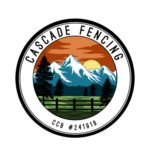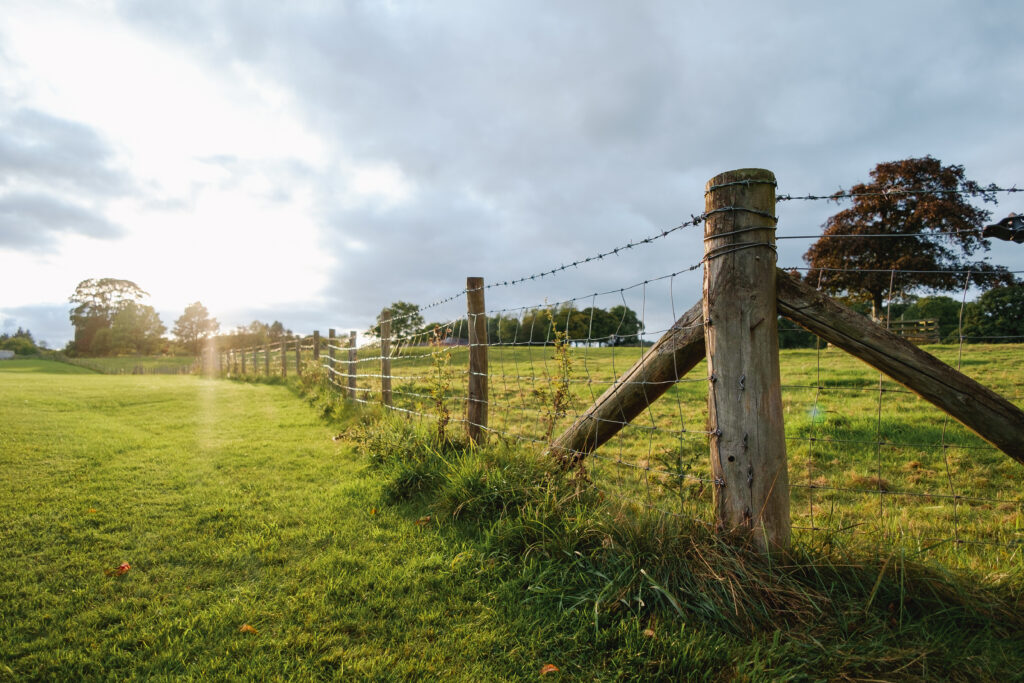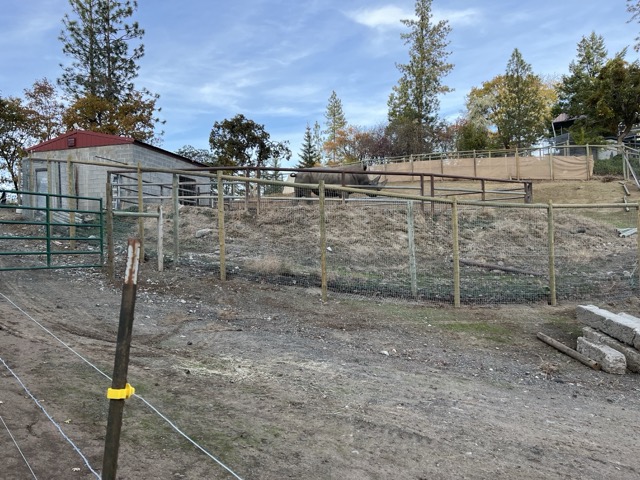Choosing the Right Fencing for Your Farm: Agricultural Fencing Options Explained
A Blog by Cascade Fencing
Which Agricultural Fencing is Best?
When it comes to managing a farm, fencing is one of the most critical investments you can make. The right fence does more than just create boundaries; it protects your livestock, secures your property, and promotes effective land management.
With so many fencing options available, choosing the best one for your farm can feel overwhelming. In this guide, we’ll explore the most common types of agricultural fencing—including cedar and chain link—and help you determine which is best suited for your livestock and land.
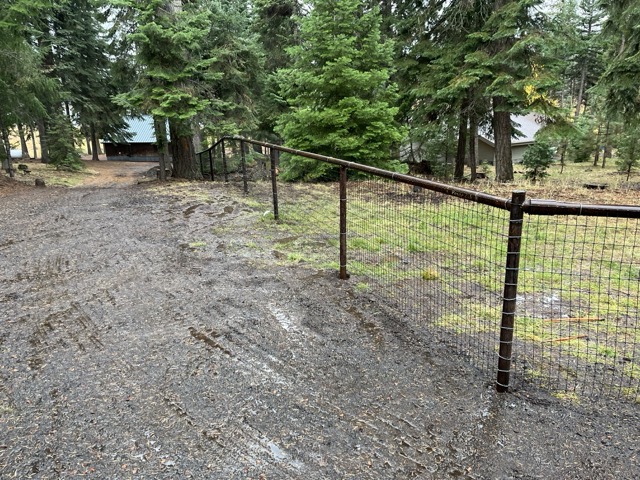
Why Agricultural Fencing Matters
Fencing is an essential part of farm infrastructure for several reasons:
- Livestock Containment and Protection: Agricultural fencing keeps livestock safely enclosed while preventing them from wandering into unsafe areas. It also protects them from predators.
- Property Security: Fencing establishes clear boundaries, keeping intruders, stray animals, or unwanted vehicles off your property.
- Land Management: Proper fencing allows you to divide land for rotational grazing, enabling better pasture health and reducing soil erosion.
- Crops and Equipment Protection: Beyond containing livestock, fencing protects valuable crops and equipment from damage or theft.
Given these important roles, selecting the right fencing type is crucial to your farm’s success.
Factors to Consider When Choosing Agricultural Fencing
Before deciding on a specific fencing option, it’s important to evaluate your farm’s unique requirements:
- Type of Livestock: Different animals have different needs. Cattle require strong, sturdy fencing, while sheep and goats need tighter barriers to prevent escapes.
- Land Size and Layout: The size of your property and the terrain will influence fencing material, cost, and installation.
- Durability Needs: If your property is exposed to harsh weather conditions, you’ll need fencing that can withstand these elements.
- Budget: While fencing is an essential investment, some options are more affordable than others. Balancing cost and longevity is key.
- Aesthetics: If the appearance of your fence matters, some materials, like cedar, offer greater visual appeal.
Agricultural Fencing Options
Below, we’ll dive into the most common agricultural fencing types, discussing their benefits, drawbacks, and ideal use cases.
1. Woven Wire Fencing
Woven wire fencing is one of the most popular choices for farms. This fencing features horizontal and vertical wires that are tightly woven together, creating a grid-like pattern. It’s ideal for containing smaller livestock like sheep, goats, and poultry.
- Benefits:
- Prevents small animals from escaping
- Protects against predators
- Durable and long-lasting
- Suitable for uneven terrain
- Drawbacks:
- Requires sturdy posts for support
- Can be time-intensive to install
- Best For: Farms with small livestock, such as sheep, goats, and chickens.
2. Barbed Wire Fencing
Barbed wire fencing is a cost-effective solution commonly used for containing large livestock like cattle. This type of fencing consists of twisted strands of wire with sharp barbs spaced at regular intervals.
- Benefits:
- Affordable and easy to install
- Effectively deters animals from pushing against the fence
- Minimal maintenance required
- Drawbacks:
- Can cause injury to animals and humans
- Less visually appealing than other fencing options
- Best For: Large properties with cattle or bison, where cost-effectiveness is a priority.
3. Electric Fencing
Electric fencing delivers a mild, safe shock to animals that come into contact with it, encouraging them to stay away. It’s a versatile option that works well as a primary or secondary barrier.
- Benefits:
- Highly effective for controlling animal movement
- Can be adjusted to different livestock types
- Easy to install and expand
- Minimal visual impact on the landscape
- Drawbacks:
- Requires a power source
- May require regular maintenance to check for faults or vegetation interference
- Best For: Farms with livestock prone to testing boundaries, such as horses, goats, or wild game.
4. Cedar Fencing
Cedar fencing is a durable and attractive option that offers both functionality and visual appeal. This type of wooden fencing is commonly used for livestock containment, property borders, and decorative purposes.
- Benefits:
- Naturally resistant to decay and pests
- Long-lasting and environmentally friendly
- Adds aesthetic value to your property
- Offers privacy and noise reduction
- Drawbacks:
- Higher upfront cost compared to some options
- Requires occasional maintenance, such as staining or sealing
- Best For: Farms that require secure livestock containment and value aesthetics, such as horse pastures or decorative areas.
5. Chain Link Fencing
Chain link fencing in Prineville, OR, is a practical and affordable choice for farms needing to secure smaller areas or separate livestock. Made of galvanized steel, this fencing is known for its strength and low maintenance.
- Benefits:
- Affordable and durable
- Easy to install and maintain
- Allows visibility while providing security
- Can be combined with privacy slats for additional coverage
- Drawbacks:
- Less visually appealing than wood fencing
- Limited effectiveness for large livestock without reinforcement
- Best For: Containing small animals or securing specific areas, such as equipment storage or gardens.
6. High-Tensile Fencing
High-tensile agricultural fencing is a modern option that’s both strong and cost-effective. It uses high-tensile wire stretched tightly between posts, providing a secure barrier for livestock.
- Benefits:
- Resistant to stretching and breaking
- Low maintenance and long-lasting
- Affordable for large properties
- Works well for both large and small animals
- Drawbacks:
- Installation requires tensioning equipment
- Can be difficult to repair if damaged
- Best For: Farms with large areas of pasture or mixed livestock.
How to Choose the Right Fencing for Your Farm
Selecting the right fencing for your farm depends on several factors:
- Purpose: Determine the primary function of the fence—whether it’s for livestock containment, property security, or crop protection.
- Budget: Balance the upfront cost with long-term maintenance and durability to find the most cost-effective solution.
- Aesthetics: If the appearance of your farm matters, opt for visually appealing options like cedar or post-and-rail fencing.
- Durability: Choose fencing materials that can withstand the elements and daily wear from livestock.
- Custom Needs: Consider custom features like electric components, privacy slats, or reinforced designs for enhanced functionality.
Fencing for Different Types of Livestock
One of the most important considerations when choosing agricultural fencing is the type of livestock you’re working with. Different animals require specific fencing solutions to ensure their safety and containment. Let’s explore the most common livestock and their fencing needs:
Cattle
Cattle are large and strong animals that can easily damage or escape from poorly built fences. Barbed wire fencing is a popular choice for cattle because it’s cost-effective and provides an effective deterrent for animals trying to push against the fence. High-tensile fencing is another excellent option for large pastures, offering durability and low maintenance. For added security, electric fencing can be incorporated to reinforce boundaries.
Horses
Horses require fences that are both secure and highly visible to avoid injuries. Cedar fencing is a preferred choice for horse enclosures due to its strength, smooth finish, and visual appeal. Split-rail fences are also common, providing an open, rustic look while still being effective. Electric fencing can be added to prevent horses from leaning on or damaging the fence.
Goats and Sheep
Goats and sheep are escape artists that require fencing with smaller gaps to prevent them from slipping through. Woven wire fencing is ideal for these animals, as it provides a strong barrier while keeping predators out. For additional protection, electric fencing can help deter climbing or pushing behavior common with goats.
Chickens and Poultry
For chickens and other poultry, agricultural fencing must prevent animals from escaping while keeping predators like foxes or coyotes at bay. Woven wire fencing with smaller openings is highly effective. A low chain link fence can also work, especially when combined with a buried section to prevent digging.
Mixed Livestock
If you manage multiple types of livestock, consider versatile fencing options like high-tensile or electric fencing. These can be customized with different heights and wire configurations to suit the needs of various animals.
Understanding the specific needs of your livestock will help you choose a fencing solution that ensures their safety, minimizes stress, and protects your farm. The right fence not only keeps your animals secure but also provides peace of mind for you as a farmer.
Maintaining Your Agricultural Fencing
Installing the right agricultural fencing is only the first step. Proper maintenance is essential to ensure the longevity and effectiveness of your fence. Without regular upkeep, even the sturdiest fences can become compromised, putting your livestock and property at risk. Here’s how you can maintain your fencing to keep it in top condition:
Routine Inspections
Conduct regular inspections of your fence to identify any weak points, damage, or areas that need attention. Look for signs of wear, such as sagging wires, broken posts, or loose connections. Inspections should be done more frequently after storms or severe weather to catch damage early.
Repair Damages Promptly
If you notice a broken post, loose wire, or damaged section, address it immediately. Delaying repairs can lead to more extensive problems, such as livestock escapes or predator entry. For barbed wire or electric fences, ensure that tension is maintained and that any broken wires are replaced.
Clear the Fence Line
Vegetation, debris, and overgrowth can put pressure on your fence and lead to structural issues. Regularly clear the fence line to prevent plants from weighing down wires or causing damage. For electric fencing, overgrown vegetation can disrupt the current, so keeping the area clear is especially important.
Protect Against Rust and Rot
For metal fences like chain link or barbed wire, apply a rust-resistant coating to extend their lifespan. Wooden fences, such as cedar, should be treated with sealant or stain to protect against rot, moisture, and pests. Regular maintenance of these materials can add years to the life of your fence.
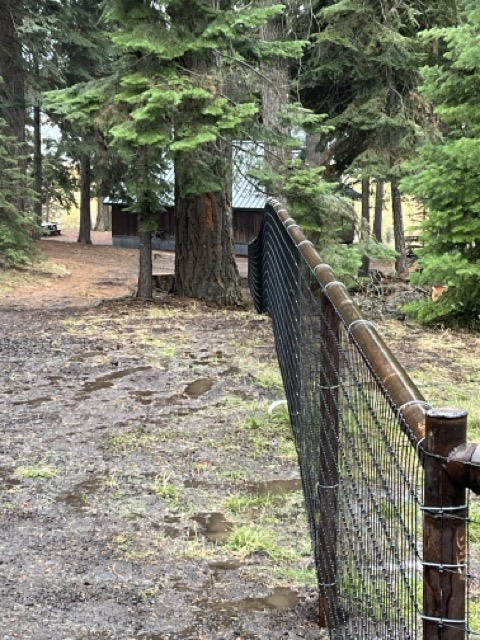
Test Electric Fencing
If you’re using electric fencing, check the voltage regularly to ensure it’s functioning properly. A fence tester can help you identify weak points or interruptions in the current. Make sure the power source is stable and that the grounding system is effective.
Seasonal Maintenance
Seasonal changes can affect your fencing. In winter, heavy snowfall or freezing temperatures can stress your fence, while summer heat can cause materials to expand. Adjustments may be necessary to maintain tension and stability.
By committing to regular maintenance, you’ll extend the life of your fence and ensure it continues to serve its purpose. A well-maintained agricultural fencing protects your investment and keeps your livestock and land secure year-round.
Making the Right Investment
Choosing the right agricultural fencing is an investment in your farm’s productivity, security, and aesthetics. By evaluating your needs, budget, and livestock requirements, you can select a fencing solution that ensures the safety of your animals, protects your property, and enhances the overall efficiency of your farm.
At Cascade Fencing, we specialize in providing high-quality fencing solutions tailored to meet the unique needs of farms in Prineville, OR. Whether you’re interested in the durability of chain link fencing or the natural appeal of cedar fencing, our team is here to help you make the best choice. Contact us today to discuss your fencing needs and take the first step toward protecting your farm for years to come.
